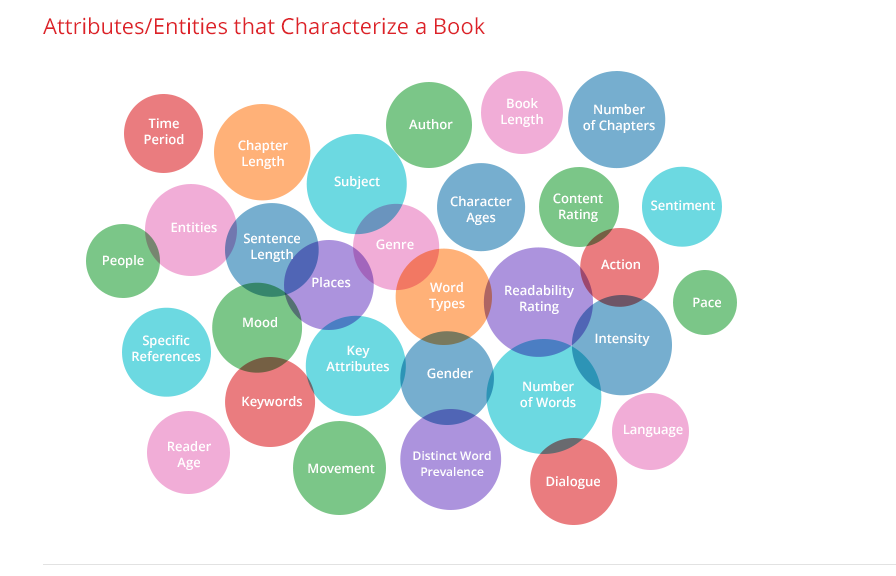Tech Desk
From the Tech Desk: Trajectory
The Next Generation of Book Recommendations
Readers will debate the pros and cons of print and digital books until the end of time. We've all heard the opposing arguments: print readers adore the experience of flipping a page, of holding something physical and substantial in their hands, and of collecting shelves full of books; eBook enthusiasts adore the convenience, affordability, and portability of their digital book collections. Regardless of which side of the debate you fall onto, though, there is one thing that isn't really debatable: book recommendations were better when everyone was reading physical print copies.
Think about it: have you ever made a life-changing discovery thanks to a book rec from Amazon.com or iTunes? Usually, these online eBook stores just spit out the most common sense book recommendations of all time: installments in a series you've already read; books from an author who you already know about; popular titles that everyone and their mother has heard of. Forget about unearthing an obscure gem, or discovering a brand new author months or years before they write the next Harry Potter: with most digital book recommendations, you're lucky if you even find something you haven't read already.
Suffice to say that so far, the digital publishing world hasn't offered anything that can rival a veteran bookseller in an independent shop, someone who can introduce you to your new favorite book after a two-minute conversation about your preferred genres and authors. A start-up company called Trajectory is hoping to change that and bring better book recommendations to the digital publishing world.
Trajectory has been a fixture in the digital publishing world since its inception in 2011. The company, according to its official website, functions primarily as "an intelligent network connecting publishers to retailers, libraries, schools, and new distribution channels around the world." Now, though, the start-up firm is trying out something new. According to an article in Publisher's Weekly, Trajectory has developed a new proprietary algorithm that will be able to provide more accurate automated book recommendations than any other system currently out there.
So how does it work? Instead of just looking at genres and authors, the Trajectory algorithm actually takes advantage of the eBook format and scans the entire text of a book. That's right: like your old trusted bookseller, the program actually reads books before spitting out recommendations. Imagine that!
In actuality, Trajectory's "proprietary algorithm" is actually a number of different algorithms, all contained under the umbrella of the "Natural Language Processing Engine." The Natural Language Processing Engine, or NLPE works like a reader would, scanning each individual sentence of a book and collecting information from it. Except instead of reading for plot, character development, and action, the NLPE system checks for some 30 other attributes. Supposedly, the system can figure out anything from the overall mood of the book (in a recent Publisher's Weekly feature on Trajectory, attributes like "pace" and "intensity" were mentioned) to the reading level.

A robot that can read, understand, and recommend a book? Sounds like we're getting dangerously close to SkyNet territory! But don't start predicting the end of days just yet: Trajectory's NLPE isn't quite to peak levels of artificial intelligence just yet. Instead, the system works in a surprisingly basic fashion, analyzing the language patterns of a book. It does so by breaking down the syntax, word choice, and language patterns of the work. This information is then compared against other books that have been scanned by the system. When books have similar language patterns, that might initiate a book recommendation. Not that the NLPE is just going to give you books that are written in a similar style. On the contrary, the algorithms of the program also track keywords, which can in turn illuminate the overall personality of a book. If something is humorous and sarcastic, Trajectory's NLPE can probably tell you. If it's sentimental and emotional, the program could let you know that, as well.
Is this all groundbreaking? After all, you can learn about the plot and personality of a book just by reading the back cover copy, and it only takes a few pages to get used to a writer's linguistic structure. Plus, if you have a trusted friend or bookseller who is always able to provide terrific new recommendations, it's tough to see anything about Trajectory's Natural Language Processing Engine that is essential. In some ways, the act of interacting with other readers, discussing books, and discovering new titles is one thing that doesn't need a completely digitalized substitute.
Still, there's a lot of potential in the NLPE. As the system scans more and more books, it will also learn more about literature as a whole, which in turn will make for better book recommendations. Sites like Amazon could use this information to improve the customer experience when it comes to shopping for and finding new books. And publishers or authors could use the information to better understand their own titles and to learn how to mark them more effectively. In other words, the biggest appeal to Trajectory's NLPE is more about business than anything else, but it's still worth knowing about for passionate readers—even those with trusted sources for book recommendations.
Craig Manning is currently studying English and Music at Western Michigan University. In addition to writing for IndependentPublisher.com, he maintains a pair of entertainment blogs, interns at the Traverse City Business News, and writes for Rockfreaks.net and his college newspaper. He welcomes comments or questions concerning his articles via email, at manningcr953@gmail.com.

